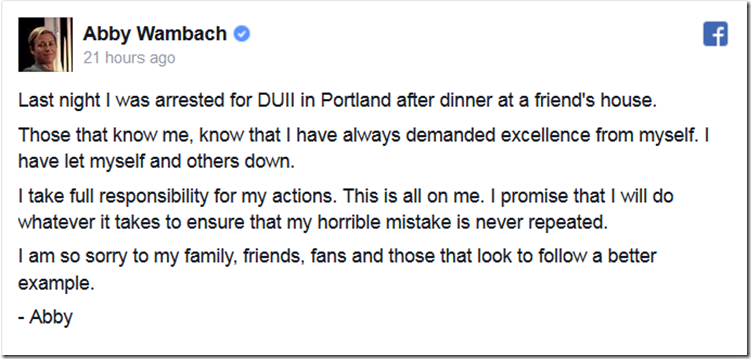A Soccer Star, A Drunk Driving Arrest, And A Perfect Apology
There are all sorts of human vulnerabilities that might lead someone to drive while intoxicated. Addiction, depression, and over-confidence come to mind as three such examples. I understand how someone can find themselves making the terrible decision to get behind a wheel and drive when they shouldn’t.
But then I think about my family being struck by that driver. I think about grieving their loss. And those thoughts override any personal sympathies for the driver I might have had and leave me unable to quickly forgive the person who could have put my (or your) loved ones at risk.
In this case, I’m talking about a specific driver—Abby Wambach, the U.S. soccer star who won two Olympic gold medals and helped her team win the 2015 FIFA World Cup. She was arrested for driving under the influence on Saturday night after running a red light in Portland, Oregon.
She was lucky, in that neither she nor anyone else was injured.

Within hours, Wambach posted a seven-sentence apology to Facebook that said everything that needed to be said.
While reading it, I found that her handling of the incident softened my impression of her. No, one brief statement doesn’t change the facts that necessitated it—but I appreciated that she owned her actions.

Her apology stood out to me as a case study for exactly what to say when things go wrong. She acted swiftly, took an unequivocal claim of responsibility, and pledged to make sure this never happened again. There’s not much more she could say at this point—and now it’s up to each of her fans to decide if and when to forgive her. (It occurs to me that her immediate claim of responsibility might limit her legal options, in which case her statement might be viewed as even more sincere.)
If all of this sounds obvious, consider that more times than not, I find that people who have been jammed up through their own actions are too slow to admit responsibility. Their first apology statement often leaves a lot to be desired, and typically rationalizes, downplays, deflects, or in some other way attempts to minimize a wrong. When that hedged first apology backfires, the person tries again, using a tone similar to Wambach’s—but at that point, it looks reactive and defensive, not authentic.
It’s true that in this type of situation, it’s easier to “do the right thing” in terms of reputational management; her task would have been much more complicated if she had hurt someone, or worse.
But she deserves credit for not compounding her first bad decision with a second one.

Photo via user Jay on Wikimedia Commons via Flickr; used with permission under Creative Commons


